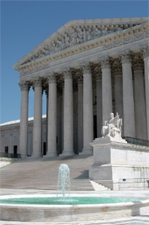Supreme Court “original jurisdiction” Part II
We did a post recently explaining that even though the Constitution gives the Supreme Court original jurisdiction of controversies between a state and the United States (such as Florida’s suit against Obamacare), that jurisdiction is not “exclusive”, and thus Florida did not have to file its suit first in the Supreme Court. As at least one person felt the post raised more questions than it answered, let me go back to the beginning.
Article I, Section 8 of the Constitution gives Congress the power to “constitute Tribunals inferior to the Supreme Court”. The first exercise of that power was the Judiciary Act of 1789. Section 13 of that Act contains the first reference (at least that I can find) to the term “exclusive jurisdiction”, and vests the Supreme Court with exclusive jurisdiction over certain enumerated types of cases, and appellate jurisdiction over other types of cases. The list of “exclusive” jurisdiction cases does not include all of the controversies over which the Supreme Court has “original jurisdiction” under the Constitution.
How can Congress possibly have the power to do this, you may ask? Well, because the Supreme Court said it did.
In Ames v. Kansas, 111 U.S. 449 (1884), the Court held,
…the Court is unwilling to say that it is not within the power of Congress to grant to inferior courts of the United States jurisdiction in cases where the Supreme Court has been vested by the Constitution with original jurisdiction.
This decision was followed up some three years later by United States v. Louisiana, 123 U.S. 32 (1887) where the Supreme Court made it clear that an action brought by a state against the United States was not within the exclusive jurisdiction of the Supreme Court.
3 Comments

The website's content and articles were migrated to a new framework in October 2023. You may see [shortcodes in brackets] that do not make any sense. Please ignore that stuff. We may fix it at some point, but we do not have the time now.
You'll also note comments migrated over may have misplaced question marks and missing spaces. All comments were migrated, but trackbacks may not show.
The site is not broken.

Can't such legalese mumbo-jumbo trivialities be ignored when millions of Americans with saved or imagined jobs are dying because they don't have health insurance? With our living and breathing Constitution, can't a "right" to health care be discerned emanating from a penumbra? Or even an umbra or antumbra for that matter. If providing free healthcare to an elderly person so the government can encourage him to die or providing women's reproductive health services to a young mother so she can abort her baby saves just one life, isn't it worth it to disregard the Constitution and precedent?
As always, you are correct, Tim. Besides the Judiciary Act of 1789 and the cases I cite are over 100 years old, and confusing!
How can the supreme court be "fair and impartial" when it is entirely made up of political appointees? I think it is a travesty they have ultimate authority in this country.